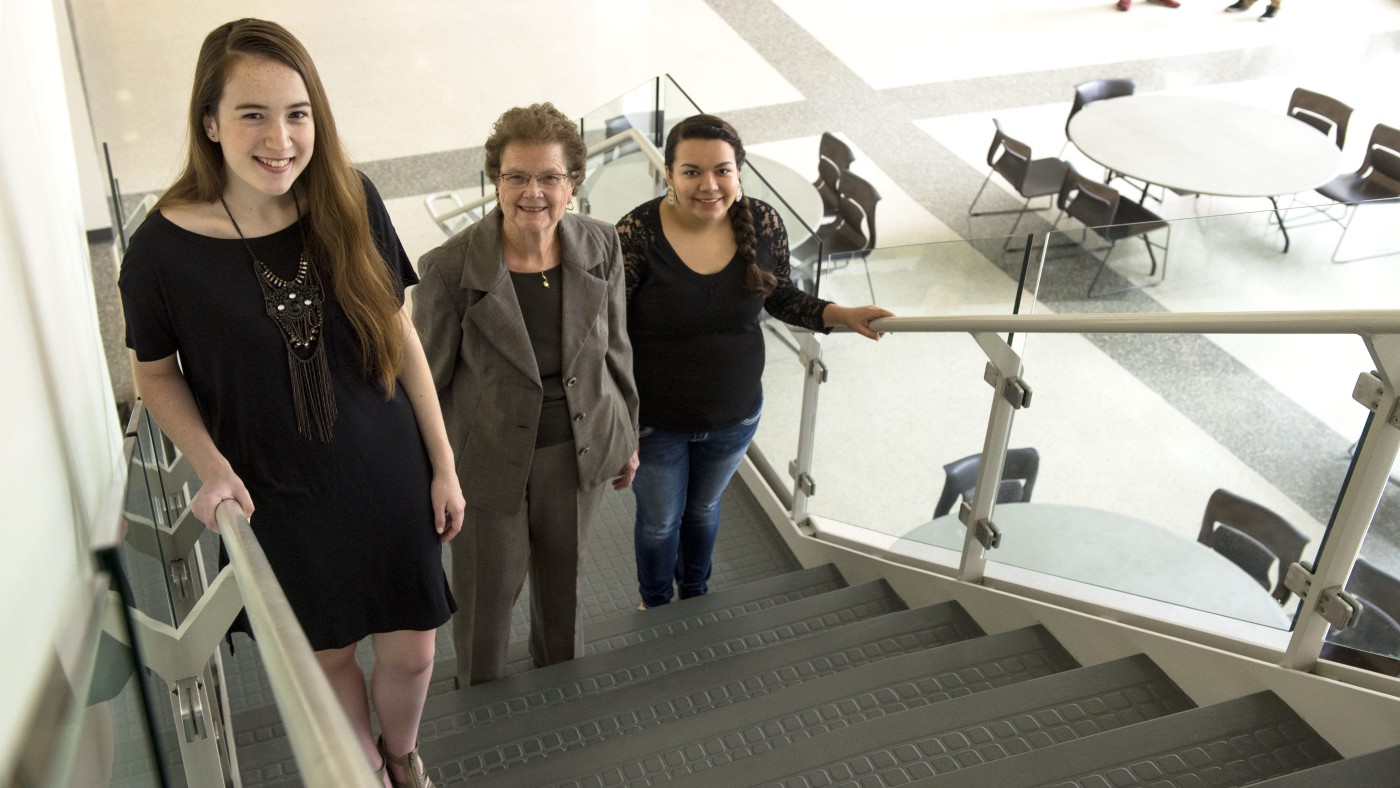Eileen Willenborg ’69 - Advocating for the Disenfranchised

This article appeared in The Magazine of Dominican University (November 2019)
Relationship and Influence
At the heart of Dominican University, and Rosary College before it, is relationship—between students, faculty, staff and sisters; and between students themselves. These relationships have the potential to influence students far beyond their years at the university. As evidenced by the alumnae profiled in the following article, the Dominican difference has the power to ignite lifetimes of activism and the desire to share with others the values instilled in them as students.
Eileen Willenborg ’69 - Advocating for the Disenfranchised
Eileen Willenborg ’69 came to Rosary College with a limited world view, self-conscious about her small-town roots and worried that she wouldn’t be able to compete with classmates from larger schools with better resources. That anxiety was erased quickly— and she left Rosary as a feminist and social activist excited about launching a career advocating for the disenfranchised. Willenborg was honored with Dominican University’s prestigious Caritas Veritas Award during Alumni Weekend.
Born in Greenup, a tiny town in central Illinois, Willenborg knew at a young age that she wanted to explore the larger world. She set her sights on Rosary after seeing a brochure about the college’s study abroad program in Fribourg, Switzerland.
The impact of the Sisters was immediate. Her advisor, Sister Martinice, boosted her confidence by confiding that she, too, came from a small town—and that the size of one’s high school wasn’t a predictor of one’s success in life. Sister Albertus Magnus, professor of history, Willenborg’s major, encouraged her students not to be defined, or confined, by their gender, often telling them to “get o the pedestal and avoid the bake sales.” Willenborg remembers a fateful gathering during which Sister Jeremy, an English professor, exhorted students to be leaders—a challenge that had a lasting impact on Willenborg.
Frank Kronke, who taught moral theology, helped spark a radical change in Willenborg’s worldview by introducing her to Catholic liberation theology, with its call for social and economic justice for the poor. He had served time in jail for protesting the Vietnam War and his activism has reverberated throughout Willenborg’s life.
Willenborg’s fierce devotion to civil rights was ignited by images of violent racial unrest in the South, as well as racist reactions to Dr. Martin Luther King’s e orts to confront segregation in Chicago. She was devastated by King’s assassination in 1968 and remembers gathering on campus with classmates the night riots broke out on the west side, watching the eerie orange glow cast by fires ravaging entire blocks of the city.
Following graduation, Willenborg did graduate work in history at Illinois State University but dropped out after realizing she wanted to be an activist instead of an academic. She worked for several years in labor relations, became a leader in the Chicago Women’s Liberation Union and co-founded a gay and lesbian political action group. She eventually earned her law degree from Rutgers University and spent the next 30 years as a union attorney fighting for workers’ rights.
As an attorney for the Association of Flight Attendants, Willenborg fought to end the airline industry’s practice of firing female attendants once they married and had children. She also helped eliminate the misogynistic weight restriction for female attendants.
In 1995, Willenborg was appointed executive director of the Chicago Local of the Screen Actors Guild-American Federation of Television and Radio Artists (SAG-AFTRA). During her tenure, she helped coordinate Chicago’s participation in a nationwide strike against the advertising industry’s attempt to pay actors a flat rate rather than the more lucrative residuals that had been part of union contracts for decades. With help from the Teamsters, SAG-AFTRA organized picket lines to shut down the buildings of large advertisers and advertising agencies in Chicago. The strike ended shortly after union workers refused to cross the picket line outside a Ford plant on Chicago’s south side.
Willenborg also served as a driving force in the creation of the Illinois Production Alliance, an organization that pushed for tax incentives that would attract motion picture and television production to Chicago. The legislation passed in 2008, benefitting the City of Chicago and local SAG-AFTRA members.
In 2009, SAG-AFTRA awarded Willenborg the George Heller Memorial Award for her contributions to performers and broadcasters in Chicago and beyond.
Throughout her life, Willenborg has remained an avid supporter of her alma mater and has funded two scholarships that are near and dear to her heart. The William and Marie Ettelbrick Willenborg Endowed Scholarship honors her parents and provides scholarships for downstate students. Another endowed scholarship honors her sister, Anne Therese, who was killed in a car accident at the age of 25. Anne was a graduate of the University of Montana and a vocal advocate for Native Americans. The scholarship gives qualified students at St. Labre Indian School, a Catholic school for Native Americans in Montana, the opportunity to attend Dominican University.
Willenborg also has funded the Willenborg Civic Learning Academy, a program that provides Dominican faculty and staff with the resources to design learning experiences for students interested in working for social and economic justice.
“I’ve had a unique and wonderful life, due in no small part to the conversations I had many years ago with my Rosary professors and classmates. Dominican helped me become the person that I am today and I hope that I can play some part in helping other students become the people they are meant to be,” Willenborg said.